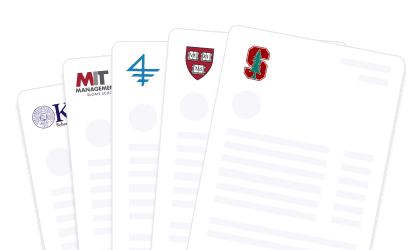How to Ask for MBA Letters of Recommendation
Learn how to ask for strong MBA letters of recommendation with this step-by-step guide. Get tips on choosing the right recommenders, providing key materials, and ensuring your letters strengthen your MBA application. Perfect for MBA applicants aiming for top business schools.
Posted June 13, 2025

Join a free event
Learn from top coaches and industry experts in live, interactive sessions you can join for free.
Table of Contents
Securing strong MBA letters of recommendation is one of the most important steps in the MBA application process for any business school. These letters provide admissions committees at top business schools with insights into your professional achievements, leadership skills, and personal qualities. Selecting the right recommenders and guiding them effectively is essential to ensure the letters support your MBA aspirations.
This guide will walk you through every step of asking for MBA recommendation letters, from identifying potential recommenders to helping them craft a letter that strengthens your application.
Choosing the Right Recommenders
What Admissions Committees Look For
MBA admissions officers view recommendation letters as a vital source of insights about your professional accomplishments, leadership skills, and growth potential. These letters offer a third-party perspective, which complements the narrative you present in your essays and resume. Admissions committees, including those at the Haas School and other top MBA programs, look for letters that:
- Highlight specific examples of leadership and professional achievements.
- Provide constructive feedback and show your ability to learn and grow.
- Showcase personal qualities like collaboration, initiative, and adaptability.
Who Makes a Great Recommender?
Current Direct Supervisor: The best choice for most MBA applicants is their current direct supervisor, as they can provide recent and relevant insights into your work. They are in the best position to address your leadership skills, ability to work closely with a team, and professional growth.
Alternative Recommenders: If asking your current supervisor isn’t feasible (e.g., due to confidentiality concerns), consider:
- A former supervisor with whom you worked closely.
- A senior colleague or project leader who has evaluated your work.
- A client or external stakeholder who can provide a unique perspective on your contributions.
Diverse Perspectives: MBA programs typically require two recommendation letters. Choose recommenders who can showcase different aspects of your candidacy. For example:
- One letter can focus on your professional achievements.
- Another letter can highlight your leadership in extracurricular activities or volunteer work.
Avoiding Common Mistakes
- Avoid asking personal acquaintances or people with impressive titles who lack direct knowledge of your work. Family friends, relatives, or unrelated professionals are generally not appropriate.
- Don’t choose recommenders who might write vague or generic letters. Admissions committees value strong recommendations with specific examples over general praise.
- A recommender’s position (e.g., CEO or VP) is less important than their ability to provide a thoughtful and detailed letter.
Preparing for the Request

When to Start the Process
Start the process as early as possible. Giving your recommenders ample time—at least one to two months before the deadline—ensures they have time to reflect on your achievements and write a thoughtful letter. A rushed letter risks being incomplete or missing key details.
How to Approach Your Recommenders
- Initiate a Thoughtful Conversation:Schedule a face-to-face meeting (or virtual call) to explain your plans and why you’re asking them to write the letter. Be clear and respectful in your request. For example:
- “I’m applying to MBA programs to pursue my long-term goal of [specific aspiration]. Your feedback on my [specific strengths] has been invaluable, and I believe you can provide a strong perspective on my candidacy. Would you be willing to write a recommendation for me?”
- Address Concerns: If they hesitate due to time constraints or lack of familiarity with the process, offer to provide a structured outline or key points they can use.
- Be Respectful: If they decline for any reason, thank them for considering it and move on to another potential recommender. A reluctant recommender can harm your application.
Equipping Recommenders with Essential Information
Provide your recommenders with all the materials they need to write a great MBA recommendation letter:
- Your Resume: A brief description of your career and accomplishments.
- MBA Application Essays: Share your MBA aspirations to help them align their letter with your application.
- Specific Achievements: Highlight projects or examples that demonstrate leadership skills, successful leadership, and personal qualities.
- School Requirements: Explain the format and submission process for each program.
The Graduate Management Admission Council has created a Common Letter of Recommendation format to streamline the process for both recommenders and applicants.
Guiding Your Recommenders
Explaining the MBA Application Process
Many recommenders may not be familiar with the MBA application process. Provide a brief overview, emphasizing the importance of recommendation letters in the admissions committee’s leadership assessment.
- The importance of recommendation letters in evaluating an MBA applicant.
- How admissions officers use these letters to assess leadership skills, professional achievements, and personal qualities.
- The specific expectations of the programs you are applying to, such as addressing leadership potential, teamwork, and areas for growth.
Providing Specific Guidance
Encourage your recommenders to:
- Use specific examples of your achievements.
- Highlight your leadership skills, teamwork, and extracurricular activities.
- Include measurable outcomes when possible.
For example, instead of saying, “The applicant is a great leader,” suggest they write something like, “The applicant successfully led a team of 10 to deliver a project ahead of schedule, resulting in a 20% cost reduction.”
Access our Free Library
Get access to videos, templates, and examples created by Leland’s top coaches. Learn how to write great essays, build strong resumes, and prepare for your application with ease.
The Common Letter of Recommendation (LoR)
Many business schools, including the Haas School, use a Common Letter of Recommendation format. This format helps the admissions committee by asking recommenders to answer specific questions, such as describing your strengths, areas for improvement, and examples of successful leadership. Make sure your recommenders are familiar with this format.
- Rank the applicant on leadership, interpersonal skills, and potential.
- Provide specific examples of contributions and growth.
- Discuss areas for improvement constructively.
Provide a copy of the questions to your recommenders early and explain how the Common LoR helps streamline the process.
Ensuring Smooth Submission
Explaining the Submission Process
Help your recommenders avoid errors or missed opportunities by:
- Outlining Submission Steps: Clarify if the letter must be uploaded to an online portal, emailed, or mailed. Provide links and instructions as needed.
- Setting Clear Deadlines: Emphasize submission dates and recommend completing letters at least a week in advance.
- Answering Questions: Be available to clarify requirements or provide additional details.
Following Up Without Being Pushy
Send polite reminders as deadlines approach. For example: “Just a quick reminder that the recommendation letter for [school name] is due next week. Please let me know if there’s anything else I can provide to assist you.”
After submission, confirm with the school that you received the letter and thank your recommender for their time and effort.
Showing Gratitude and Maintaining Relationships
Thanking Your Recommenders
Express your appreciation with a personalized thank-you note. Let them know how much their support means to you. Once you receive admissions decisions, update them and thank them again for their role in your success.
Building Long-Term Professional Relationships
A strong professional recommendation can lead to future opportunities. Maintain these relationships by staying in touch and offering career updates.
Additional Tips and Best Practices
- If you’re a prospective student with little work experience, consider asking professors or mentors who can vouch for your potential.
- Highlight transferable skills and leadership qualities relevant to MBA programs.
- Encourage recommenders to ask open-ended questions about your accomplishments.
- Provide a draft of key points to guide their writing process without dictating their content.
Get Expert Help From MBA Admissions Coaches
Work with experienced MBA admissions coaches who know what it takes to stand out. From crafting the perfect essays to preparing for interviews, our coaches provide personalized guidance to help you get into your dream MBA program. Start working with a coach today and take the next step toward MBA success.
Final Thoughts
Securing strong MBA letters of recommendation is a critical step in the MBA application process. These letters offer admissions committees valuable insights into your professional background, leadership potential, and personal qualities. By choosing the right recommenders, preparing them with the right materials, and guiding them through the process, you can ensure that your recommendation letters enhance your application and set you apart from other candidates.
Remember, the key to success is starting early, being clear about your goals, and providing your recommenders with the tools they need to write strong, specific letters. With careful planning and thoughtful communication, you can submit MBA recommendation letters that truly reflect your strengths and increase your chances of admission to top business schools.
Related Articles
Looking to strengthen every aspect of your MBA application? Check out these helpful articles from our library, packed with actionable tips, examples, and strategies:
- The Ultimate MBA Application Guide
- 10 Essential Tips for a Successful MBA Application
- How to Write a Powerful MBA Essay—With Examples
- The MBA Application Timeline—With Chart
- 5 Common Red Flags in MBA Applications (& How to Overcome Them)
- How to Ace Your MBA Interview: With Prep Questions & Answers
- What is MBA Application Strategy?
- How to Accelerate Your MBA Application – From an Expert Coach
FAQs
How many letters of recommendation are required for MBA applications?
- Most MBA programs require two letters of recommendation. These letters should ideally come from people who have directly supervised your work and can offer specific examples of your professional achievements and leadership skills. While some schools may allow a third letter, it's important to check each program's specific requirements to ensure you're meeting their guidelines.
Can I submit a letter of recommendation from a peer or colleague?
- While letters from peers or colleagues can be valuable, most MBA programs prefer letters from individuals in positions of authority, like a current or former supervisor. This is because a supervisor can provide insights into your professional abilities and leadership qualities that a colleague may not be able to speak to as effectively. A peer's letter may not carry the same weight as one from a direct supervisor, so it's usually better to go with someone who has observed your work in a more formal capacity.
Should I waive my right to view my letters of recommendation?
- It's generally a good idea to waive your right to view your recommendation letters. Doing so shows that you trust your recommenders to write candidly, which can make your letters seem more genuine and impactful. Admissions committees often view letters as more credible when applicants have waived their right to access them. So, unless you have a specific reason to want to read the letter, it's best to let your recommenders submit them without you seeing the content.
How can I ensure my recommenders write strong letters?
- To ensure your recommenders write strong letters, you should provide them with as much useful information as possible. Share your resume, personal statement, and any achievements or projects you want them to mention. Be clear about the submission process, deadlines, and any specific format or questions that the MBA programs require. It's also helpful to give them a sense of the key qualities you’d like them to focus on, such as leadership, problem-solving, or your ability to work in teams.
What should I do if a recommender declines my request?
- If a recommender turns down your request, don’t take it personally. They may feel they can’t provide the strong, supportive letter that you need. In that case, it’s best to approach someone else who can speak to your qualifications and experiences in a meaningful way. Always thank them for considering your request and keep the relationship positive, as you may have other opportunities to work with them in the future.
Browse hundreds of expert coaches
Leland coaches have helped thousands of people achieve their goals. A dedicated mentor can make all the difference.


























